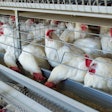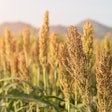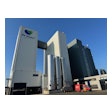French start-up nextProtein, which produces insect-based animal feed and fertiliser, has raised €10.2 million in Series A funding to scale up its production and lead the industry in innovation.
Using EU-approved organic waste and proprietary technologies to raise black soldier fly larvae for animal feedstocks, the agtech company will first target the growing aquaculture industry. This more sustainable feed source addresses simultaneously the future global protein shortage while also protecting oceans and reducing food waste, contributing to a circular economy.
“Insect protein provides solutions to major societal problems: a growing population with a higher demand for fish and meat and a degrading environment,” said Syrine Chaalala, who co-founded the company in 2015 with her partner Mohamed Gastli, a chemical engineer and entrepreneur.
“Addressing these macro-trends at scale demands a commitment of equal magnitude from us. Delivering on this pledge has required nextProtein to be at the forefront of sustainable indoor and vertical farming innovation, and to gather the best and brightest to drive future progress,” says Gastli.
nextProtein’s current first facility, in Tunisia's Cap Bon region, uses significantly less land and energy compared to traditional sources of protein such as beef and soy. The production method also requires almost no water and has a lower overall carbon footprint.
The latest investment will enable nextProtein to build a second cutting-edge facility, hire new talent and accelerate its research and development programme. The company plans to scale production to 100,000 tonnes per year by 2025, or an estimated 10 per cent of the total insect protein market globally.
nextProtein’s products include protein powder for farmed fish, poultry, pigs and pets, thereby replacing more resource-intensive or costly feed sources. For instance, one kilogram of insect protein is estimated to save three kilograms of ocean fish from being caught for use as fishmeal.
“While sustainability is a prerequisite to our impact, price competitiveness determines its scale and pace,” said Etienne Raynaud, Head of Strategy for the company.
“We have worked hard to become the most cost-efficient player, and this fundraising will enable nextProtein to emerge as a prominent industry-shaping company for the decade to come by bringing to market the next generation of insect-derived products.”
Headquartered in Paris, nextProtein exemplifies the shift towards a full circular economy, moving away from the industry standard of using cereal by-products as a main feed source for the insects – for which there is already other market demand – to focus instead on wasted fruits and vegetables.
“The agricultural sector is ripe for disruption, especially if we hope to feed a growing global population sustainably,” added Chaalala. “With nextProtein, we are helping mainstream a new environmentally friendly industry, so it is very important to keep the highest standards in order to build and maintain consumer trust in our products.
“Our strategy was to find raw materials that were local, unwanted and available in large quantities so as to reintegrate these nutrients into our food systems, giving new value to what was essentially considered worthless or even burdensome.”
The company is currently one of the rare few with operations outside the European Union to have its products certified through the region’s Trade Control and Expert System (TRACES), the strictest standards in the world for overseeing the import of animal products within its borders.
The latest funding round was led by a group of investors coordinated by Blue Oceans Partners, including Telos Impact and RAISE Impact, with support from Mirova, an affiliate of Natixis Investment Managers, through the Althelia Sustainable Ocean Fund[1], Kepple Africa Ventures and Aucfan Incubate Inc.
“We are excited to back nextProtein because it has developed the most scalable insect farm model to date, which is the key for insect protein to become a mainstream animal and aquaculture feed,” says Christian Lim, co-founding Partner of Blue Oceans Partners.
Lisa Hubert, Blue Investment Manager at Mirova Natural Capital, added: “We are delighted to have signed this deal with nextProtein. In this challenging and uncertain environment, more than ever, we must be committed to working with innovative ways to provide new feed solutions and to preserve the health of our oceans.”
The investment positions nextProtein to tap into a global fishmeal market worth €7bn and growing at eight per cent every year, as well as the even bigger livestock feed (€400bn) and pet food markets (€50bn).
Since 2015, the start-up has attracted funds from a wide range of high-profile investors including Xavier Niel’s Kima Ventures, Khaled Helioui, an early investor in Uber, Deliveroo and OpenClassrooms, and Cyril Grislain, an investor in Stripe, Devialet and Headspace.
















